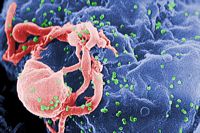Researchers Crack the Mystery of AIDS Immunity
Submitted by Annie White on November 9, 2010 – 2:38 pm
Around 1 in 300 people who are infected with HIV are able to bear the infection without progressing to illness and can delay the start of treatment. Bruce Walker has been researching this mystery actively since 2006 and has finally found his answer. It seems as simple as a cellular game of hide and seek.
Bruce Walker, an AIDS researcher at Harvard University and Massachusetts General Hospital, has long been trying to understand why some people with HIV can remain untreated for decades and never progress to AIDS. On Nov. 4, 2010 Walker and colleagues published research that helps explain these HIV controllers: genetic variations that change key proteins in their immune systems.
The genetic variations change about a half-dozen amino acid building blocks; those variants make cells that are infected with HIV visible to the body’s immune system and vulnerable to attack. NPR explained:
Five of the six variants are within a protein that controls how certain immune cells, called CD4s, display bits and pieces of viral protein on their outer shell — if they happen to be infected with a virus. HIV has a special affinity for infecting CD4 cells, and without constant antiviral treatment the virus slowly destroys the immune systems of most infected people.
But if a person has the newly discovered amino acid variants, his CD4 cells will be especially good at displaying pieces of HIV in a binding groove, or pocket of their outer coat. That enables killer cells, immune cells called CD8s, to target and kill the infected cells before they can spew forth more viruses.
For most people, the lack of these protective variants renders their HIV-infected cells invisible to their immune system.
Walker’s team has also found these variants in people of European and African descent and in Hispanics. His team hopes their findings will help researchers figure out how to manipulate the immune response in people who do not have the benefit of the genetic variations.
By: Meredith Melnick
Read more:
http://www.sciencemag.org/cgi/content/abstract/science.1195271
http://healthland.time.com/2010/11/05/study-researchers-crack-the-mystery-of-aids-immunity/
